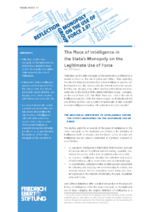Think Piece 17: The Place of Intelligence in the State's Monopoly on the Legitimate Use of Force
Summary
- Reflections on the state monopoly on the legitimate use of force have tended to focus on the role of police and military while neglecting the role of intelligence.
- Independent civilian intelligence agencies can be integral to how the state provides for national and human security but they may also play a key role in securing authoritarian and autocratic rule.
- A system of democratic, civilian oversight and control offers the only means of reconciling the vital functions of intelligence with both state and human security. Such a robust system of democratic intelligence oversight and control ultimately provides a way to operationalise the legitimacy of the state’s monopoly on the use of force.
Chappuis, Fairlie
The place of intelligence in the state's monopoly on the legitimate use of force
Zum Download (PDF) (260 KB, PDF-File)
Latest Issues
- Mely Caballero-Anthony, Frieden und Sicherheit | Publikation
Think Piece 22: Security in Times of Uncertainty in Asia
Asias security outlook still appears to be laden with uncertainties. From the changing dynamics in the balance of power, an emboldened North Korea and…
- Ann L. Phillips, Frieden und Sicherheit | Publikation
Think Piece 21: Providing Security in Times of Uncertainty
The final report, distills the findings of a two-year effort by more than 20 international experts to find answers on how to overcome rising…
- Jaïr van der Lijn, Publikation
Think Piece 20: The future of the monopoly on the legitimate use of force - Four alternative global futures
The paper presents four alternative global futures for the monopoly on the legitimate use of force that aim to allow policy makers to embrace…
